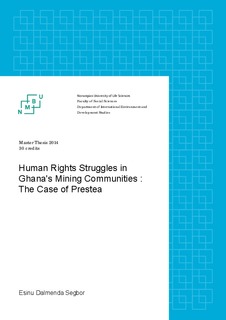| dc.description.abstract | Ghana, like many other developing economies has initially made frantic but futile efforts to attract the necessary foreign investment that would help to drive mineral resource exploration forward for development. With the World Bank’s recommendation for a favourable investment environment, Ghana embarked on the Economic Recovery Programme (ERP) with much necessary relaxation of mining codes that attracted much investment to the mining sector. But the much needed investment also came at the cost of several reported cases of unfavourable impacts, considered as abuse of human rights of people in mining communities.
With several constitutional and institutional reforms, there was increased in the growth of Civil Society Organizations (CSO) and awareness of human rights in the mining communities of Ghana also. Several Non-Governmental Organizations (NGOs were reported to have sprung up in the mining communities of Ghana to educate the people on their rights and to help them get the needed justice when their rights have been trampled upon. This drive became what is dubbed as “struggles for human rights” in this study because there have been reports of difficulties in getting justice for affected communities.
With purely qualitative research tools, this study investigated some of the claims of abuse of rights of people in Ghana’s mining communities by adopting the Prestea area for a case study. Base on international treaties like the International Bill of Rights that have been ratified by Ghana and Ghana’s constitutional and institutional policy provisions like the Minerals and Mining Acts of 2006, the study made some stunning findings about abuse of rights and how the people and supporting NGOs struggled for justice.
The study identified issues that impact on the rights of the people; ranging from forceful taking of land and destruction of property with little or no compensation, pollution of water sources, environmental degradation, and restriction of movements with reckless arrests, shootings and beatings amongst others. To this were several struggles by the people and NGOs for justice, with little success in most cases due to ineffectiveness of most of the policy provisions against abuse and protection of the mining companies by governments.
The study revealed that, much needs to be done about Ghana’s policy implementation to ensure the protection of people’s rights, so as to realize the needed benefit that has been assessed as negative for the communities so far. | nb_NO |
